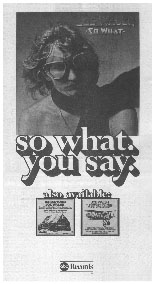![]()
  |

So What
Joe Walsh
Dunhill 50171
Released: December 1974
Chart Peak: #11
Weeks Charted: 22
Certified Gold: 1/14/75
 As he's moved westward -- from the East Coast to Ohio to Colorado to Los Angeles -- Joe Walsh has assimilated one regional rock style after another. Walsh's appealing and extremely well-made third solo album, So What, attests to his varied background. It pits his adenoidal vibrato against Eagles-like California harmonies and plays his bashing, propulsive chording style off against more sedate picking of an apparently gentle soul.
As he's moved westward -- from the East Coast to Ohio to Colorado to Los Angeles -- Joe Walsh has assimilated one regional rock style after another. Walsh's appealing and extremely well-made third solo album, So What, attests to his varied background. It pits his adenoidal vibrato against Eagles-like California harmonies and plays his bashing, propulsive chording style off against more sedate picking of an apparently gentle soul.
Disregarding a brief, sophomoric goof track, "All Night Laundry Mat Blues," So What goes eight for eight, both in the performances themselves and in the clean way they've been recorded (by Walsh and John Stronach, with former producer Bill Szymczyk responsible for one track). Three simple rockers, "Welcome to the Club," "Time Out" and "Turn to Stone," are distinctive ones as ones by Townshend or Richard, but played more with refinement than sheer raunch.
 Click image for larger view. |
Add to these an inexplicably touching synthesizer performance (by Walsh) of a brief segment from Ravel's "Mother Goose Suite," a pair of harmony tunes, "Falling Down" and "Help Me through the Night," that would make any country-rock group brown with envy, a first-rate, orchestrated pop melodrama, "Song for Emma," and an almost completely instrumental "County Fair," and the result is an unpretentious, playable album. And if the mode in which this music is presented appears through its harmonies and sentiments to be mainstream L.A. rock, there's an important difference: Walsh doesn't need to rev himself up to play rock & roll -- if anything, he has to hold himself back.
In his unassuming way, Walsh has made So What into a nearly classic representation of the forms and textures of present-day American rock & roll.
- Bud Scoppa, Rolling Stone, 4/24/75.
Bonus Reviews!
Joe Walsh is the former lead singer of the James Gang. This album is packaged as though what he does is of momentous import. It isn't.
Walsh has made it difficult to know what the tunes are about, having chosen to sound like he was recorded at the bottom of a well, lined with tin, while he miaowed the lyrics into a water glass. I was at first annoyed that lyrics had not been provided, but after the second listening I was grateful. This is simply another dreary collection of you-better-get-your-fertilizer-together diatribes, plus the required "interpretation" of a classical melody, plus a batch of self-pitying ditties about how hard life is and how grateful we should be that rock-and-roll musicians like Joe Walsh are defending us from latent fascism by offering us a (yawn) counterculture life-style. In short, the title for the album amply describes what's in it.
- Joel Vance, Stereo Review, 5/75.
Walsh's remarkably effective LP technique of inserting change-of-pace sensitive ballads into his basic approach of tasteful hard rock is here again as before, but even more polished than ever. Lots of major singles possibilities here for today's market. Walsh even does a synthesizer tour-de-force on the classical Ravel's "Pavanne" for one cut. Best cuts: "Welcome To The Club," "Song For Emma," "Turn To Stone."
- Billboard, 1975.
![]() Reader's Comments
Reader's Comments
No comments so far, be the first to comment.
